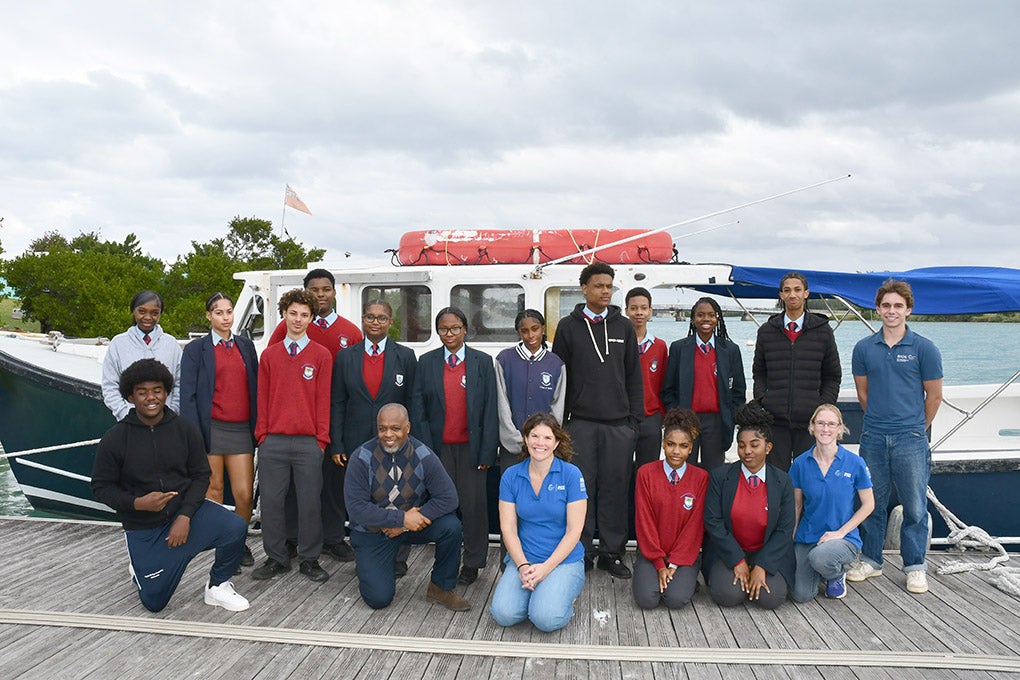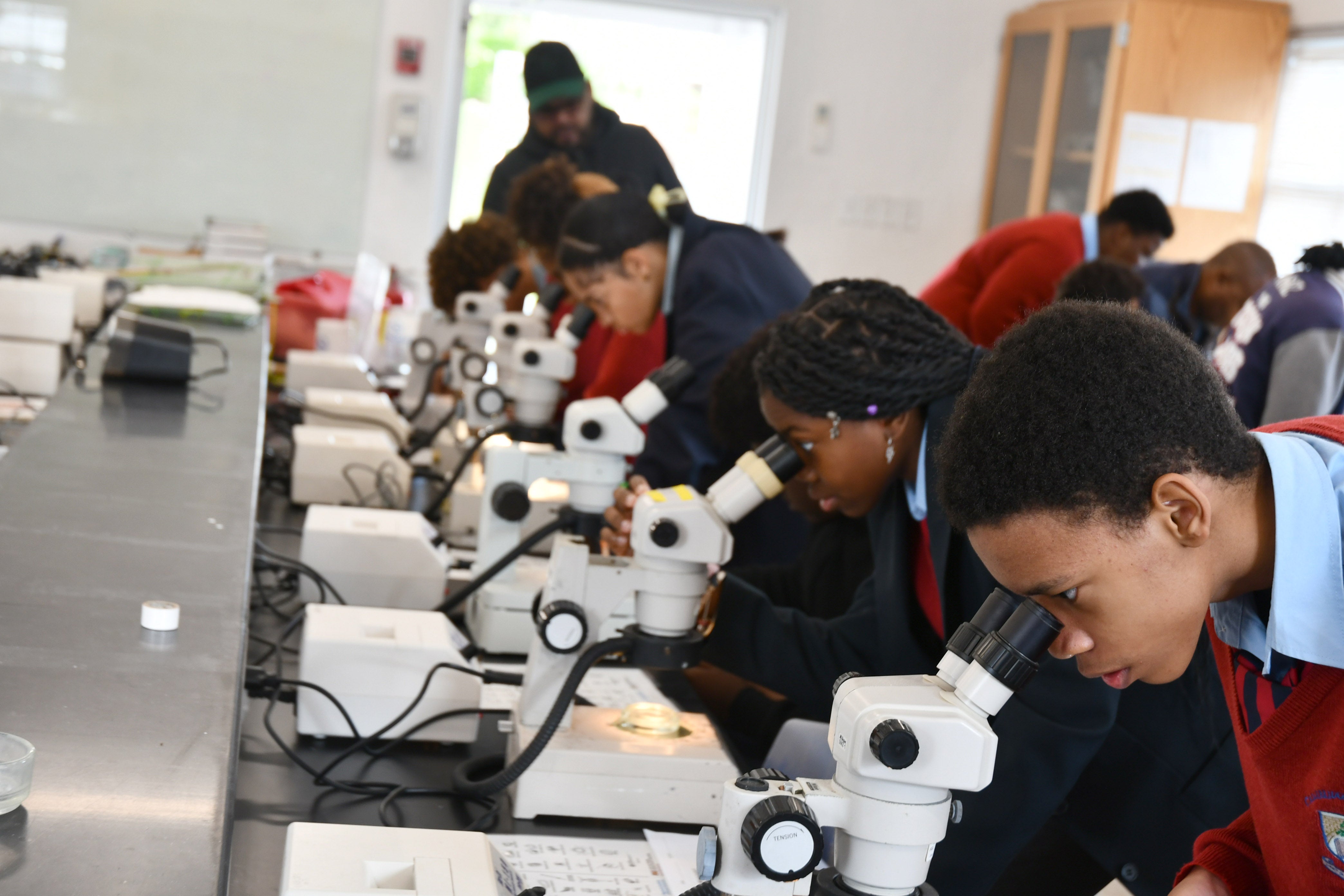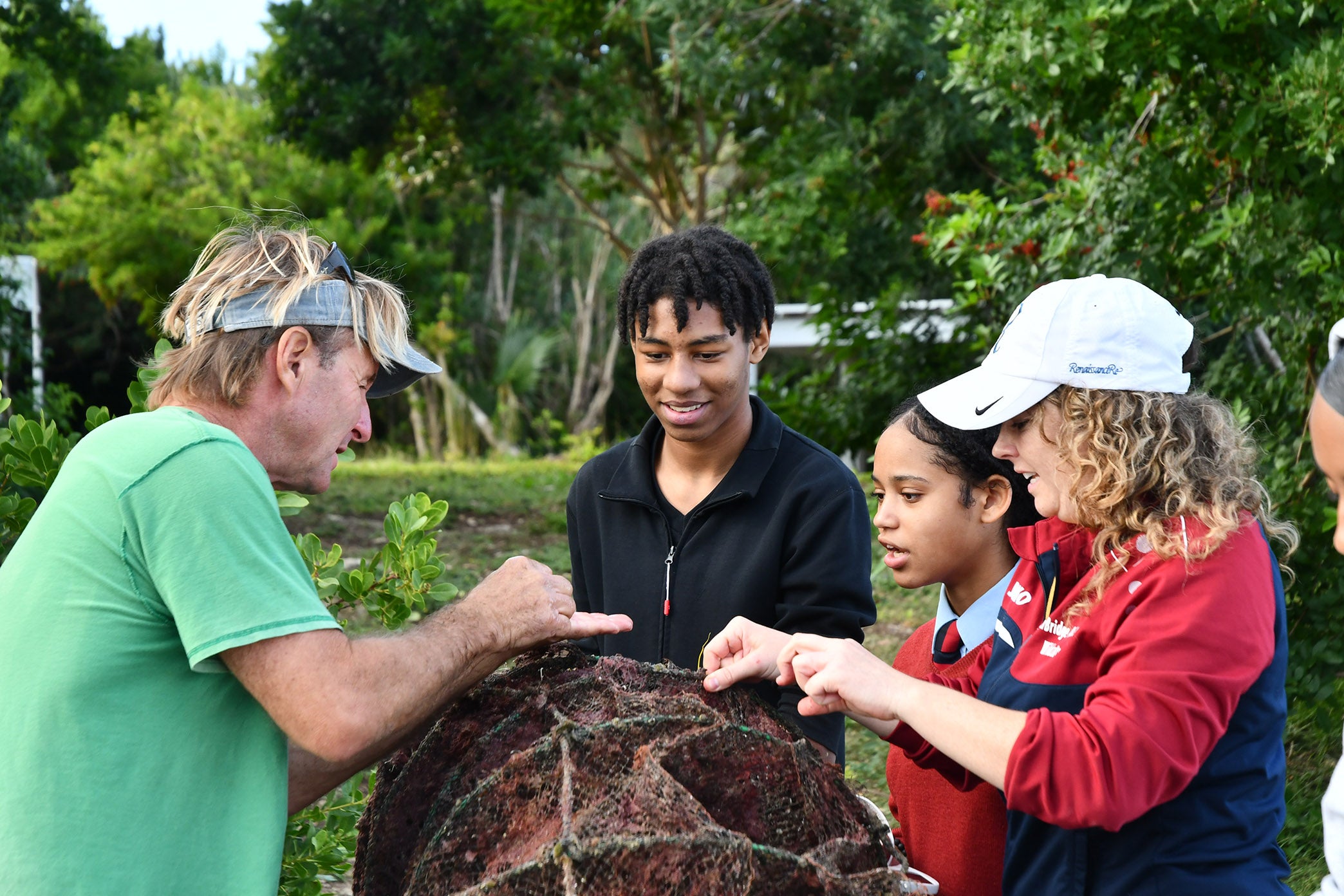Posted in:
The Outdoor Classroom
CedarBridge Academy joins forces with ASU BIOS and Waterstart through Signature Learning Partnerships

The Signature Learning Partnership is a cornerstone of the educational initiatives at the Bermuda Institute of Ocean Sciences (ASU BIOS). Building on this strong foundation, a recent collaboration was established between ASU BIOS, CedarBridge Academy, and Waterstart. This program engaged students aged 14 to 16 in science learning through hands-on experiences across various environmental and scientific fields, providing them with a wide range of STEM (science, technology, engineering, and mathematics) pathways.
This program included CedarBridge Academy’s Senior 1 (S1) and Senior 2 (S2) classes, comprised of 76 students who recently participated in the highly impactful Signature Learning Partnership, supported by the Ministry of Education. In 2024, two weeks of educational sessions were held over September and December, focusing on environmental topics designed to engage students through an interactive curriculum. These lessons complemented CedarBridge’s biology syllabus and aimed to deepen students' understanding of natural systems. The partnership sought to equip students with the knowledge and critical thinking skills needed to address local and global environmental challenges.
Students had the unique opportunity of participating in field trips to ASU BIOS’s campus at Ferry Reach and Waterstart’s classroom on Burt Island. The novel curriculum encouraged them to think critically about Bermuda’s diverse marine and terrestrial habitats. These immersive experiences exposed students to the abundant opportunities available at these unique locations on our island. According to Ashley Robinson, Head of Science at CedarBridge Academy, “collaboration between CedarBridge Academy, ASU BIOS and Waterstart is a great example of how partnerships can transform education.”

In September, ASU BIOS welcomed an enthusiastic group of S1 students, offering an immersive experience designed to ignite curiosity about coral reefs. The program began with an introductory lecture highlighting the importance of coral reefs, including their biological classification, their critical role in protecting Bermuda’s coasts from hurricanes and erosion, and their contribution to global marine biodiversity. Students put their newfound knowledge into practice through a hands-on activity in which they identified coral species by matching names to coral replicas, guided by marine scientists and educators on site.
During their visit to ASU BIOS, students were introduced to the Bermuda Marine Mesocosm Facility, an outdoor experimental lab designed to study environmental systems under controlled conditions. Guided by Dr. Brett Jameson, students had the opportunity to observe ongoing research and learn about critical work conducted at the facility. The group explored tanks housing coral in controlled environments and gained insights into how the facility is being used to investigate the effects of thermal stress, research which aims to better understand the resilience of Bermuda's coral reefs in the face of climate change.
Collaboration such as this offered a unique opportunity for high school students to engage directly with leading professionals and researchers at ASU BIOS, showcasing the invaluable transfer of knowledge to Bermuda’s youth. Reflecting on the program, Ms. Melanie Burrows, a faculty member of the science department at CedarBridge Academy, remarked, “this hands-on experience not only enriched their understanding of ocean science but also inspired a deeper passion for protecting our ecosystems.”
In total over 100 students have benefitted from the Signature Learning Partnership during the two years the learning framework has been in operation. Kaitlin Noyes, Director of Education and Community Engagement, has spearheaded this initiative with the goal, in her words, “to provide students with a window into what’s possible, while reinforcing curricular standards.” She also emphasized that these “experiential learning opportunities and the career guidance offered helps students identify new career opportunities on and off-island.” Noyes further noted, “partnering with Waterstart introduces students to a broader range of environmental topics, exposing them to additional career pathways in conservation and sustainability management.”

While at Burt Island, CedarBridge Academy students had the opportunity to engage with Waterstart experts, who shared their knowledge of plant taxonomy in both terrestrial and coastal habitats. Students were exposed to the importance of native and endemic species in maintaining a healthy environment. Waterstart’s Education Officer, Anne Kermode, who served as an instructor during this trip, remarked that “welcoming students to our outdoor campus is the first step in helping them connect with a real, physical environment” and is an “impactful way for students to decide how they will make a difference.”
During the trip, students surveyed the biodiversity of the eight-acre island and learned about the impacts of invasive species such as Casuarinas, Brazil Pepper, and Allspice. Identifying key species is critical for conservation efforts in Bermuda and encourages students to become environmental stewards for the island. Waterstart, dedicated to woodland and coastal restoration, emphasizes the importance of long-term maintenance efforts on Burt Island. Collaborating with local non-governmental organizations (NGOs) such as Waterstart fosters a sense of ownership and responsibility to protect and conserve natural habitats.
In December, a separate group of CedarBridge S2 students visited ASU BIOS, exploring a different yet important topic, namely the food chain. They delved into the microscopic world of plankton and marine food webs. Plankton are responsible for producing roughly half of the oxygen on Earth and play a crucial role in marine ecosystems, contributing to the global carbon cycle and serving as a foundation of the marine food chain. The students had the opportunity to board the 41 ft R/V Stommel, one of our smaller research vessels, to participate in a plankton tow.
This experience left a lasting impression on the group, with one student, Janos Lindsay, saying “it was so exciting to collect samples and look at them under the microscope. Seeing all the tiny organisms was incredible, and I never realized how important plankton are to the entire food chain.” These microscope techniques introduced students to biological systems that are typically difficult to visualize. In parallel, they also had the opportunity to use Virtual Reality (VR) technology which helped explain these systems and the vital role plankton play in maintaining the balance of our oceans. This multi-sensory experience deepened local students’ understanding of the intricate connections that sustain life beneath the waves. With access to these novel environmental tools and complementary hands-on activities, students gained a comprehensive understanding of the topics covered and developed the skills necessary to tackle environmental challenges.
Complementing the knowledge acquired at ASU BIOS, this group also visited Burt Island, where they received training from the Waterstart team on food security and the role aquaculture plays in the blue economy. Working collaboratively in groups, students explored the journey of food from its source to the table and identified local food sources in Waterstart’s vibrant garden. Given Bermuda’s heavy reliance on imported goods and services, the trip to Burt Island sparked important discussions on how Bermuda can become more sustainable. Students debated farming and aquaculture practices, examined the implications of growing our own produce, and explored alternative approaches that could be applied in Bermuda.
One such discussion explored the implications of aquaculture, such as the farming of oysters and its impacts on our economy and environment. For example, students learned that oysters can purify water and remove excess pollutants, in fact, a single adult can filter up to 200 liters of water per day, nonetheless such benefits are only favorable when implemented in a sustainable framework. Students examined the challenges from a holistic perspective and with the guidance of JP Skinner, Director of Waterstart, the group saw a small-scale oyster farm and experienced the process of cleaning the bags that house oysters and scallops.
Aaliyah Berkeley, a student attending the field trip, commented that “cleaning oysters was my favorite part. It was amazing to learn how oysters self-clean our oceans and it made me realize how important they are for the environment.” JP Skinner believes that “environmental education requires immersive outdoor experiences to be truly engaging for young people,” and explained how, “the most powerful way to get students to develop a sense of ownership for nature is to give them opportunities to explore, study and protect natural habitats.” Furthermore, he noted that “when a student has had a safe, fun, productive experience outdoors, they begin to call that space their own and will want to protect it.”
These learning partnerships go beyond simply providing knowledge – they inspire the next generation. Dennilyn Outerbridge-Zuill, an attending student, shared, “it is amazing to have community partners who care about the next generation” giving them the chance “to explore marine science and to follow our passions.” An S2 student, Qeir Liaxin Yparraguire, described the program as "such an enlightening experience” and “encourages all schools on the island to consider partnerships with ASU BIOS and Waterstart.”
Collaborative partnerships between the scientific community, local NGOs, and schools offer a transformative approach to education, blending innovative curricula with a holistic focus on community development and student engagement. While discovering future careers in STEM fields through this partnership, students also gained valuable insights into educational opportunities at ASU BIOS and Waterstart, including upcoming camps and internship programs.
By fostering a unique combination of innovative learning between our local research institute, NGOs and public schools, we can directly transfer knowledge and experience to Bermuda’s students. This empowers the next generation of Bermudians to reshape their relationship with the environment, discover new career paths, and pursue their passions, ultimately making a positive impact on the world. This Signature Learning Partnership, and the support of Centennial Bermuda Foundation, is providing a wealth of opportunities for local students.
Tagged: